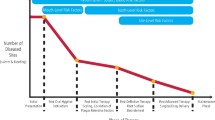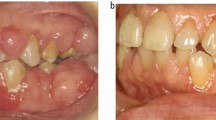Abstract
'Another day of gum gardening', 'more cleaning below the gum line', 'I had to stabilise their perio before I could start my treatment'; quotes overheard from peers on a shared teaching clinic. Gardening, weeding and cleaning have never been popular hobbies for undergraduate students! However, the importance of healthy gums resulting from satisfactory periodontal treatment should never be underestimated by either patient or dental student.
Similar content being viewed by others
Key points
-
Reflects on periodontology teaching at university.
-
Encourages self-reflection on the periodontal management of patients in practice.
-
Displays to students the opportunities available within periodontology.
-
Encourages shared clinical treatment involving the whole dental team.
Introduction
Periodontics has long been the gateway subject to clinical practice, bridging the gap between preclinical studies in anatomy, biochemistry, microbiology and immunology, to name but a few. In the context of periodontology, all have links with the periodontium, and the treatment of which has long provided a smooth introduction to the clinical environment. However, ten years ago, periodontology was said to be undergoing an 'image problem',1 with 'students having a lack of awareness of what periodontists do and the subject not being seen as challenging, exciting or complex dentistry'.2 However, as a current undergraduate dental student a decade on, I feel there has been a change in perception. We now have a clear understanding of the surgical and non-surgical management of periodontitis, the indications for both, and an appreciation of the continual learning curve we will experience throughout our careers as our experience in periodontology builds.
Periodontal stabilisation without the support of a hygiene-therapy colleague can easily be viewed as an obstacle to restorative treatment, this can lead to brief and ineffective oral hygiene instruction, rushed root surface debridement and a patient whose periodontal state will never have the chance to fully improve. In a recent self-reflective questionnaire carried out within an American dental school, 63.1% of undergraduate students reported that the periodontal care they had provided for their patients had, in their own opinion, been inadequate.3 This was attributed to a range of factors including demanding academic requirements and limited clinical time, poor time management or failure of patients to attend appointments. This is quite concerning and hopefully not paralleled in the UK system. The importance of periodontal treatment is, in my experience, suitably emphasised at the undergraduate level and so it must be, otherwise we will continually provide a disservice to our patients and profession.
An undergraduate perspective
As an undergraduate, I currently undertake non-surgical treatment in the form of root surface debridement, and one day hope to incorporate periodontal surgery into my skill set, manipulating both hard and soft tissue with equal competency. On a personal level, periodontics has the potential to be so much more than surgical or non-surgical. It provides opportunities for excellent and effective teamwork, communication and leadership collaboration working closely with all members of the dental team. Collaborative practice will become more and more commonplace in the future. Practising sociably in a team inspires me!
Additionally, utilising colleagues' varying skill mix has huge benefits for the patient. In 2018, a Swedish study assessed patients' attitudes to dentists and dental hygienists and found that participants had a less negative attitude towards dental hygienists and that this disparity in attitudes was particularly pronounced in younger patients.4 This confirms that we should make full use of our hygiene-therapy colleagues moving forward, as it appears that our patients prefer it. Dental students' attitudes to shared clinical treatment have been shown to be generally positive. One particular study highlighted the need for a greater understanding of teamwork by all members of the dental team, a continuous awareness of the full extent of each individual clinical remit and the need for a less dentist-centric view of our profession.5
Periodontology also provides students with the opportunity to engage with medical colleagues and laboratory-based scientific research from an early stage in their career, should this appeal to them. Periodontal disease requires constant continued scientific investigation. The updated periodontal classification sets the stage for an exciting period of scientific research which will further elucidate the complex relationships between periodontal disease and systemic health.6 This research will also provide a platform to further unravel the complex genetic and environmental causative factors and advance our understanding of the disease mechanism.
Furthermore, with the knowledge that 28-56% of patients who have an implant placed have been shown to develop peri-implantitis.7 Another benefit of pursuing a continued education in periodontology is the opportunity for the expansion of skill sets beyond those taught at an undergraduate level. Developing skills in safe and judicious implant placement and maintenance appears to provide an extremely fulfilling postgraduate education.
I ask any student reading this article, what were your motivations for studying dentistry? Does the idea of undertaking intricate periodontal surgical procedures intrigue you? Does the ability to practise at the top of your field scientifically, yet simultaneously be able to own and run your own business excite you? Do you want to learn the true art of delivering effective and impactful oral hygiene instruction, to maximise the chances of mutual success to any surgical interventions you make? These are the factors that drive me to: provide treatment which is to the best of my ability; broaden my understanding of manipulating soft tissue elegantly; and begin to develop more advanced practical skills.
References
Ward V, Ide M. Specialisation in Periodontology The Problem. 2008. Available at https://www.bsperio.org.uk/publications/downloads/news_2008.pdf (accessed August 2019).
Heasman P A, Witter J, Preshaw P M. Periodontology in the undergraduate curriculum in UK dental schools. Br Dent J 2015; 219: 29-33.
Chandrasekaran S, Powell C, De la Rosa L, Mittal A, Johnson L. Dental students' reflections on quality of periodontal care in dental school clinics. J Dent Educ 2017; 81: 14-21.
Öhrn K, Hakeberg M, Abrahamsson K H. Dental beliefs, patients' specific attitudes towards dentists and dental hygienists: a comparative study. Int J Den Hyg 2008; 6: 205-213.
Ross M K, Turner S, Ibbetson R J. The impact of teamworking on the knowledge and attitudes of final year dental students. Br Dent J 2009; 206: 163-167.
Tonetti M S, Greenwell, H, Kornman K S. Staging and grading of periodontitis: Framework and proposal of a new classification and case definition. J Clin Periodontol 2018; 45 (Spec Iss): S149-S161.
Zitzmann N U, Berglundh T. Definition and prevalence of peri-implant diseases. J Clin Periodontol 2008; 35 (Spec Iss): 286-291.
Author information
Authors and Affiliations
Corresponding author
Rights and permissions
About this article
Cite this article
Clark-Roberton, D. Periodontology from an undergraduate perspective. Br Dent J 227, 597–598 (2019). https://doi.org/10.1038/s41415-019-0727-3
Published:
Issue Date:
DOI: https://doi.org/10.1038/s41415-019-0727-3



